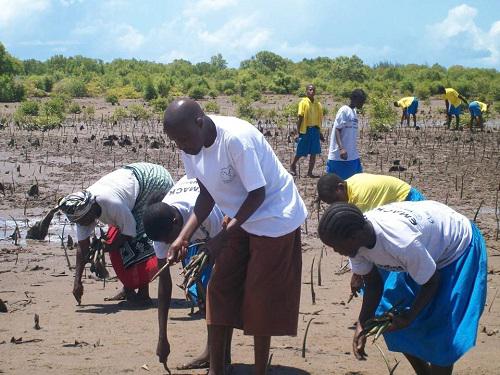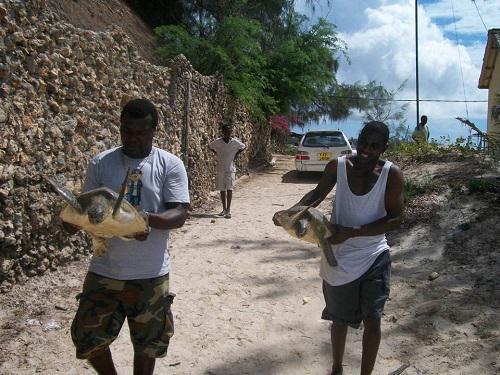Edward Mwamuye
Other projects
The aim of the project is to promote grass-roots conservation of the marine environment through education and awareness focussing on sustainable resource utilization to reduce environmental degradation.

Mangrove planting.
Poverty, increasing population pressure, and lack of education and awareness, commonly result in over-fishing and illegal/destructive habits along the Kenyan coast.

Turtles released back to the sea.
The increasing destruction of the marine environment ultimately impacts negatively on the lives of the coastal communities, resulting in a cycle of poverty and environmental abuse.
The key to the future survival of the marine environment is education and awareness of local coastal people of the importance of conservation to a healthy marine environment and the maintenance of future livelihoods. It is the coastal people that have daily interactions with, and impacts on, this resource and therefore fundamental to the success of any conservation efforts.
The increasing destruction of the marine environment along the Kenyan coast ultimately impacts negatively on the lives of the coastal communities. The coastal communities are lacking in education and awareness regarding to sustainable use and management of their natural marine resources. Growing population pressure has led to over-fishing and an increase in illegal and destructive habits brought by high poverty levels.
The project seeks to implement an education and awareness programme targeting the public who at a given time visit the beach, students who are tomorrow’s resource users, fishermen who about 70% of their activities are marine related, dive centres which conduct diving sessions for their clients in the ocean, boat operators who organize tourists visits to the MPAs, sport fishers and tourists who come for holidays in different hotels.
The project will develop and produce different educational packages for each target groups. The project also will develop guidelines for best practices in fishing, sport fishing, snorkelling and swimming. This will be done together with stakeholders in the marine sector.
Through the proposed project activities, coastal fishing communities will develop an understanding of marine turtle biology and their endangered status, will learn that conservation of turtles and their environment is crucial for ecosystem functioning, and will develop strategies for sustainable marine resource use.